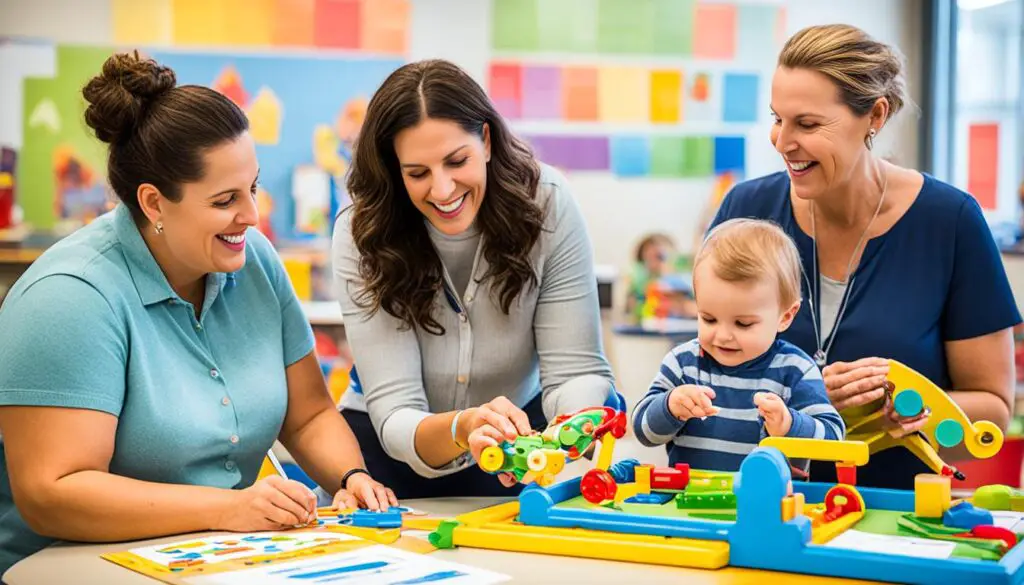
Navigating Early Childhood Development Education Requirements
The field of early childhood development education has specific requirements that individuals must meet in order to pursue a career in this rewarding field. These requirements vary depending on the state and the specific job role, but there are some commonalities across the board. In the United States, early childhood educators typically need to have a minimum of a high school diploma or equivalent, along with specialized training and education in early childhood development. Many states also require individuals to obtain a license or certification to work in this field. It’s important for aspiring early childhood educators to understand the specific education requirements in their state and to ensure they meet the necessary qualifications.
Key Takeaways:
- Early childhood development education requirements vary by state and job role.
- In the United States, a high school diploma or equivalent is typically required.
- Specialized training and education in early childhood development is necessary.
- Licensure or certification may be required in many states.
- Aspiring early childhood educators should research and meet the specific requirements in their state.
Education and Training for Early Childhood Development Educators
In order to work as an early childhood development educator, individuals often need to complete specific education and training programs. Many community colleges and universities offer associate or bachelor’s degree programs in early childhood education, which provide students with the necessary knowledge and skills to work with young children. These programs typically cover topics such as child development, curriculum planning, and behavior management.
Additionally, some institutions also offer specialized training courses and workshops for individuals already working in the field who are looking to enhance their skills and knowledge. These programs may focus on specific areas such as inclusive education, special needs education, or language development.
The Benefits of Formal Education in Early Childhood Development
Formal education in early childhood development not only equips educators with the theoretical foundation needed to understand child development and learning processes but also provides valuable hands-on experience through practicum placements. These placements allow students to apply their knowledge in real-world settings, working closely with experienced practitioners. This experiential learning is essential in developing practical skills and gaining a deeper understanding of the challenges and rewards of working with young children.
Hands-on experience allows educators to develop important skills in working with young children.
In addition to formal education, many states also require early childhood educators to obtain certification or licensure. This process varies by state but often involves passing an exam, completing continuing education courses, or demonstrating proficiency in certain areas of early childhood development. It’s important for individuals to research the specific requirements in their state and choose an education and training program that meets those requirements.
Continuing Education and Professional Development
Continuing education and professional development are crucial for early childhood educators to stay updated on the latest research, best practices, and innovations in the field. Many professional organizations and institutions offer workshops, conferences, and online courses that allow educators to enhance their knowledge and skills throughout their careers. These opportunities help educators stay current and provide the best possible education and care for young children.
Educators who pursue advanced degrees, such as a Master’s in Early Childhood Education or a specialization in areas like administration, leadership, or research, can further their career prospects and opportunities for advancement.
Certification and Recognition Programs
Besides formal education, some educators may choose to pursue additional certifications and recognition programs to further their professional development or specialize in specific areas of early childhood education. These programs may include certifications in bilingual education, early literacy, or working with children with special needs. These certifications demonstrate a commitment to excellence and can give educators a competitive edge in the job market.
Furthermore, many states offer voluntary certification programs such as the Child Development Associate (CDA) credential, which provides recognition for individuals who meet specific competency standards in early childhood education. The CDA credential is a widely recognized certification that demonstrates an educator’s dedication and expertise in working with young children.
Overall, early childhood education training and certification are essential components of becoming a qualified and competent early childhood development educator. By completing the necessary education and training programs, educators gain the knowledge, skills, and credentials needed to provide quality care and education for young children.

Experience and Skills for Early Childhood Development Educators
In addition to education and training, experience working with young children is often a valuable asset for early childhood development educators. Many employers prefer to hire candidates who have practical experience in a childcare setting, such as working in a preschool or daycare center. This hands-on experience allows individuals to apply their knowledge in a real-world setting and develop important skills in working with young children.
Some skills that are beneficial for early childhood educators include:
- Effective communication: The ability to clearly communicate with young children, their parents, and other team members is crucial in providing a nurturing and supportive environment.
- Patience: Working with young children requires patience and understanding as they navigate their early years of development.
- Creativity: Being able to engage children in creative and stimulating activities helps foster their cognitive, social, and emotional growth.
- The ability to create a nurturing and supportive environment: Early childhood educators play a vital role in creating a safe and welcoming space where children can thrive and feel supported in their learning and development.
It’s important for aspiring early childhood educators to seek out opportunities to gain experience in the field and develop these essential skills. Whether through internships, volunteer work, or entry-level positions, hands-on experience can greatly enhance an individual’s ability to connect with and support young children.
Real-World Success Story
“Working as a volunteer in a local preschool allowed me to apply my early childhood education training and put my skills into practice. Seeing the impact I had on the children’s growth and development was incredibly rewarding. It solidified my passion for this field and inspired me to pursue a career as an early childhood development educator.”

| Experience | Description |
|---|---|
| Preschool Assistant | Assisted lead teachers in developing and implementing age-appropriate curriculum, supervised children during activities, provided emotional support and guidance. |
| Daycare Volunteer | Engaged children in creative play and learning activities, assisted with mealtime and nap routines, collaborated with other volunteers and staff to ensure a safe and nurturing environment. |
| Childcare Internship | Observed and assisted experienced early childhood educators, participated in lesson planning and implementation, interacted with children and parents to promote effective communication and build relationships. |
Conclusion
Navigating the education requirements for a career in early childhood development can initially appear challenging, but with the right information and preparation, pursuing a rewarding career in this field is definitely achievable.
By understanding the specific early childhood development education requirements in your state, completing the necessary education and training programs, gaining practical experience, and developing essential skills, you can position yourself for success as an early childhood development educator.
It is also crucial to stay informed about any changes or updates in the field of early childhood education and continually expand your knowledge and practice in this area. Dedication and passion are key attributes that will enable you to make a positive impact on the lives of young children and their families.
FAQ
What are the education requirements for a career in early childhood development?
To pursue a career in early childhood development, individuals typically need a minimum of a high school diploma or equivalent, along with specialized training and education in early childhood development. Many states also require individuals to obtain a license or certification.
What education and training programs are available for early childhood development educators?
Many community colleges and universities offer associate or bachelor’s degree programs in early childhood education. These programs cover topics such as child development, curriculum planning, and behavior management. Additionally, individuals may need to obtain certification or licensure, which may involve passing an exam or completing continuing education courses.
Is prior experience working with children necessary for a career in early childhood development?
While not always required, experience working with young children is often preferred by employers in the field of early childhood development. Practical experience in a childcare setting, such as working in a preschool or daycare center, allows individuals to apply their knowledge and develop important skills in working with young children.
What skills are important for early childhood development educators?
Effective communication, patience, creativity, and the ability to create a nurturing and supportive environment for children are all valuable skills for early childhood educators. These skills help educators effectively engage with young children and support their growth and development.
How can I navigate the education requirements for a career in early childhood development?
To navigate the education requirements for a career in early childhood development, it’s important to research the specific requirements in your state and choose an education and training program that meets those requirements. Additionally, gaining practical experience and developing essential skills can help position you for success in this field.